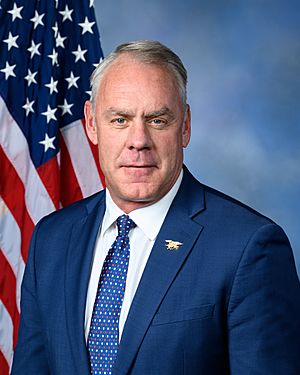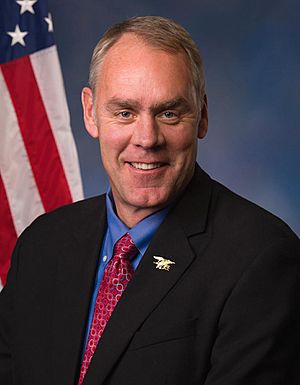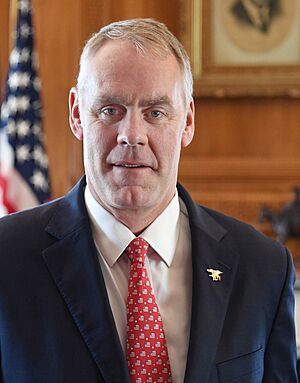Ryan Zinke facts for kids
Quick facts for kids
Ryan Zinke
|
|
|---|---|

Official portrait, 2023
|
|
| Member of the U.S. House of Representatives from Montana |
|
| Assumed office January 3, 2023 |
|
| Preceded by | Constituency reestablished |
| Constituency | 1st district |
| In office January 3, 2015 – March 1, 2017 |
|
| Preceded by | Steve Daines |
| Succeeded by | Greg Gianforte |
| Constituency | At-large district |
| 52nd United States Secretary of the Interior | |
| In office March 1, 2017 – January 2, 2019 |
|
| President | Donald Trump |
| Deputy | David Bernhardt |
| Preceded by | Sally Jewell |
| Succeeded by | David Bernhardt |
| Member of the Montana Senate from the 2nd district |
|
| In office January 3, 2009 – January 3, 2013 |
|
| Preceded by | Dan Weinberg |
| Succeeded by | Dee L. Brown |
| Personal details | |
| Born |
Ryan Keith Zinke
November 1, 1961 Bozeman, Montana, U.S. |
| Political party | Republican |
| Spouse |
Lolita Hand
(m. 1992) |
| Children | 3 |
| Education | University of Oregon (BS) National University (MBA) University of San Diego (MS) |
| Signature |  |
| Website | |
| Military service | |
| Allegiance | United States |
| Branch/service | United States Navy |
| Years of service | 1986–2008 |
| Rank | Commander |
| Unit |
|
| Awards | Bronze Star (2) Defense Meritorious Service Medal (2) Meritorious Service Medal (4) Joint Service Commendation Medal (2) Army Commendation Medal |
Ryan Keith Zinke (born November 1, 1961) is an American politician and businessman. He currently serves as a U.S. representative for Montana's 1st district, a role he has held since 2023. He is a member of the Republican Party.
Before his current role, Zinke was a U.S. representative for Montana's at-large district from 2015 to 2017. He also served in the Montana Senate from 2009 to 2013. From 2017 to 2019, he was the United States secretary of the interior under President Donald Trump. He left this position after some questions were raised about his actions.
Zinke was a U.S. Navy SEAL from 1986 until 2008, retiring as a commander. He was the first Navy SEAL to be elected to the U.S. House of Representatives. As a member of Congress, he supported using ground troops to fight ISIS and was against the Affordable Care Act. He also opposed some environmental rules and the idea of giving federal lands to states.
When he was Secretary of the Interior, Zinke allowed more oil, gas, and mineral exploration on some federal lands. His actions led to investigations by the Interior Department's own watchdog group.
Contents
Early Life and School
Ryan Zinke was born in Bozeman, Montana, and grew up in Whitefish. His father was a plumber. Zinke was an Eagle Scout, which is the highest rank in the Boy Scouts.
He was a great athlete at Whitefish High School. He earned a football scholarship to the University of Oregon. He played as a center for the Oregon Ducks football team. In 1984, he earned a bachelor's degree in geology. He also earned a master's degree in business in 1993 and another master's degree in global leadership in 2003.
Military Service
Ryan Zinke served as a U.S. Navy SEAL from 1986 to 2008. He retired with the rank of commander. He completed the tough Basic Underwater Demolition/SEAL (BUD/S) training in 1986.
He served with SEAL Team ONE and later with the United States Naval Special Warfare Development Group (NSWDG). During his time with NSWDG, he helped plan and carry out secret operations. He also served as a leader in different roles.
In the late 1990s, Zinke made a mistake by billing the government for some personal travel. He paid back the money. His promotion to commander was approved the next year.
From 1999 to 2004, he held leadership roles at Naval Special Warfare Unit Two and the Naval Special Warfare Center. In 2004, Zinke was a deputy commander in Iraq, leading over 3,500 Special Operations personnel. After his time in Iraq, he helped lead the main SEAL training center. In 2006, he helped create the Naval Special Warfare Advanced Training Command. He served as the dean of this school until he retired from the Navy in 2008.
Military Awards
Ryan Zinke received several awards for his military service. These include:
- Bronze Star (twice)
- Defense Meritorious Service Medal (twice)
- Meritorious Service Medal (four times)
- Joint Service Commendation Medal (twice)
- Army Commendation Medal
- Navy and Marine Corps Commendation Medal
- Navy and Marine Corps Achievement Medal (twice)
- Combat Action Ribbon
- Joint Meritorious Unit Award
- Navy Meritorious Unit Commendation
- National Defense Service Medal
- Armed Forces Expeditionary Medal
- Kosovo Campaign Medal
- Global War on Terrorism Expeditionary Medal
- Iraq Campaign Medal
- Armed Forces Service Medal
- Humanitarian Service Medal
- Navy Sea Service Deployment Ribbon
- Navy and Marine Corps Overseas Service Ribbon
- NATO Medal for Former Yugoslavia
- Navy Expert Rifleman Medal
- Navy Expert Pistol Shot Medal
He also earned the Special Warfare insignia (SEAL Trident) and the Navy and Marine Corps Parachutist Insignia.
Business Work
After his military career, Zinke started some businesses. In 2005, he created Continental Divide International, a company that helps manage properties and develop businesses. His family members also work for this company. In 2009, he started another consulting company called On Point Montana.
He also served on the board of an oil pipeline company called QS Energy from 2012 to 2015. In 2014, he announced that his family would take over Continental Divide, but he would still advise them.
In January 2019, Zinke started a new job as a managing director at Artillery One. This is a company that invests in cryptocurrency. He also took on consulting jobs with several energy companies.
Political Career
Montana State Senator (2009–2013)
Zinke was elected to the Montana Senate in 2008. He served from 2009 to 2013, representing the city of Whitefish. During this time, he was seen as a moderate Republican.
He led the Senate Education Committee. He supported using technology in classrooms and giving local communities more control over their schools. He also served on the Senate Finance and Claims Committee.
In 2010, he signed a letter that said global warming was a "threat" and that "clean energy" was important. However, he later changed his views on climate change.
U.S. House of Representatives (2015–2017)
In 2014, Zinke ran for Montana's at-large congressional district. He won the election and became a U.S. Representative. He was re-elected in 2016.
In Congress, Zinke supported sending U.S. ground troops to fight ISIS. He also wanted to get rid of the Affordable Care Act and reduce government rules. He supported removing the estate tax.
Views on Key Issues
Education
In 2015, Zinke voted for a plan to expand digital learning. This plan would have created a program to help schools use technology for learning. The plan passed in the House but did not become law.
Environmental Rules
Zinke often voted against environmental groups. He supported coal mining and oil and gas drilling. When President Trump allowed drilling in almost all U.S. coastal waters, Zinke helped exempt Florida's coast from this drilling.
Climate Change
Zinke's views on climate change have changed over time. In 2010, he signed a letter asking for laws about clean energy and climate change. But after 2010, he often said he doubted that human activity was the main cause of climate change. During his confirmation hearing for Interior Secretary, he said humans "influence" climate change but did not fully agree with the scientific view that human activity is the main cause.
Federal Lands
Zinke disagreed with many Republicans about transferring federal lands to states. He called such ideas "extreme" and voted against them. In 2016, he even left a Republican meeting because of a plan to give public lands to states. He believed in better management of federal land, not giving it away.
Committee Work
In 2017, Zinke was a member of these committees:
- Committee on Armed Services
- Committee on Natural Resources
Secretary of the Interior (2017–2019)
On December 13, 2016, Ryan Zinke was chosen by President-elect Donald Trump to be the United States Secretary of the Interior. The Senate approved his nomination on March 1, 2017, and he was sworn into office the same day.
The day after he was sworn in, Zinke rode a United States Park Police horse to his welcome ceremony at the Department of Interior building.
Changes to Rules
Lead Bullets
On his first full day in office, Zinke removed a rule that banned lead bullets and fishing gear in national wildlife refuges. This rule was put in place by the previous administration to prevent lead contamination in animals. Zinke said his decision would help hunters and outdoor lovers have more access to public lands.
National Monument Reductions
In 2017, Zinke started reviewing many national monuments. He wanted to see if any of them should be made smaller. He suggested reducing the size of Bears Ears National Monument and Grand Staircase–Escalante National Monument.
In December 2017, President Trump signed orders that greatly reduced the size of these two monuments. These changes were supported by some Republicans but criticized by Democrats and environmental groups. Documents later showed that the goal was to increase access for coal, oil, and gas mining.
Spending Questions
In 2017, reports showed that Zinke used private planes for some trips. For example, he chartered a jet for $12,375 to fly from Las Vegas to Montana. Commercial flights for the same trip usually cost around $300. He also used government helicopters for travel, including one trip that cost over $14,000. The Interior Department said these trips were for official business.
The Interior Department's own watchdog group investigated Zinke's use of these flights. They found that one chartered flight was not for official business.
Flag Flying
When Zinke became Secretary, he ordered that the official flag of the Secretary of the Interior be flown over the main Interior Department building whenever he was there. If he was away, his deputy's flag would be flown. This was an unusual practice for a federal government official.
Trophy Hunting
In November 2017, it was announced that President Trump, following Zinke's advice, wanted to lift the ban on importing elephant and other big-game trophies from Zambia and Zimbabwe. Zinke, a hunter himself, said he wanted to promote hunting for American families. Critics worried this would harm elephant populations. Trump later put the decision on hold. In March 2018, the Fish and Wildlife Services allowed trophy hunting for elephants on a "case-by-case basis."
Greater Sage-Grouse
In 2017, Zinke took steps to change a 2015 plan that protected the greater sage-grouse. The Interior Department wanted to change how sage grouse habitats were managed in 10 states. This could open these areas to mineral extraction and grazing. This was welcomed by the oil and gas industry but criticized by environmentalists.
Migratory Bird Treaty Act
Under Zinke, the Interior Department changed how it understood the Migratory Bird Treaty Act. They said that killing birds was not against the law if the main purpose of an activity was not to kill birds. This was opposed by many former Interior Department officials, who said it went against how the law had been understood for decades.
Department Employees
In June 2017, Zinke suggested cutting 4,000 jobs from the Interior Department. He also supported cutting the department's budget. He ordered 50 senior employees to be moved to different jobs, sometimes to places or roles they had little experience with. One scientist said this was because he spoke out about climate change.
Zinke also said that about one-third of Interior Department employees were not loyal to President Trump. This comment was criticized by groups representing park and wildlife service employees.
Departure from Office
On December 15, 2018, President Trump announced that Zinke would leave his position at the end of the year. Zinke later said he could not justify spending money to defend himself against "false allegations." His resignation came after several federal investigations into his actions.
Return to U.S. House of Representatives (2023–present)
Elections
2022 Election
In June 2021, Zinke announced he would run again for the U.S. House of Representatives. This time, he ran for Montana's 1st congressional district, which was created after the 2020 census. He won the election against Democratic candidate Monica Tranel.
2024 Election
In 2024, Zinke won re-election for Montana's 1st congressional district. He defeated Monica Tranel again.
Current Term
In 2023, Zinke voted against a resolution that would have required President Joe Biden to remove U.S. troops from Syria.
During the Gaza war, Zinke proposed a law that would stop people with passports from the Palestinian Authority from entering the U.S. He stated on his website that the bill aimed to "Expel Palestinians from the United States."
In June 2025, Zinke spoke against a Senate bill called the One Big Beautiful Bill. He was concerned about the bill's plan to sell over 1.2 million acres of public lands.
Personal Life
Ryan Zinke married Lolita Hand on August 8, 1992. Lolita had a young daughter from a previous marriage. Ryan and Lolita also have two children together. He is Catholic.
Zinke divides his time between Washington, D.C., his hometown of Whitefish, Montana, and Santa Barbara, California, which is his wife's hometown.
Images for kids
See also
 In Spanish: Ryan Zinke para niños
In Spanish: Ryan Zinke para niños
 | Delilah Pierce |
 | Gordon Parks |
 | Augusta Savage |
 | Charles Ethan Porter |





